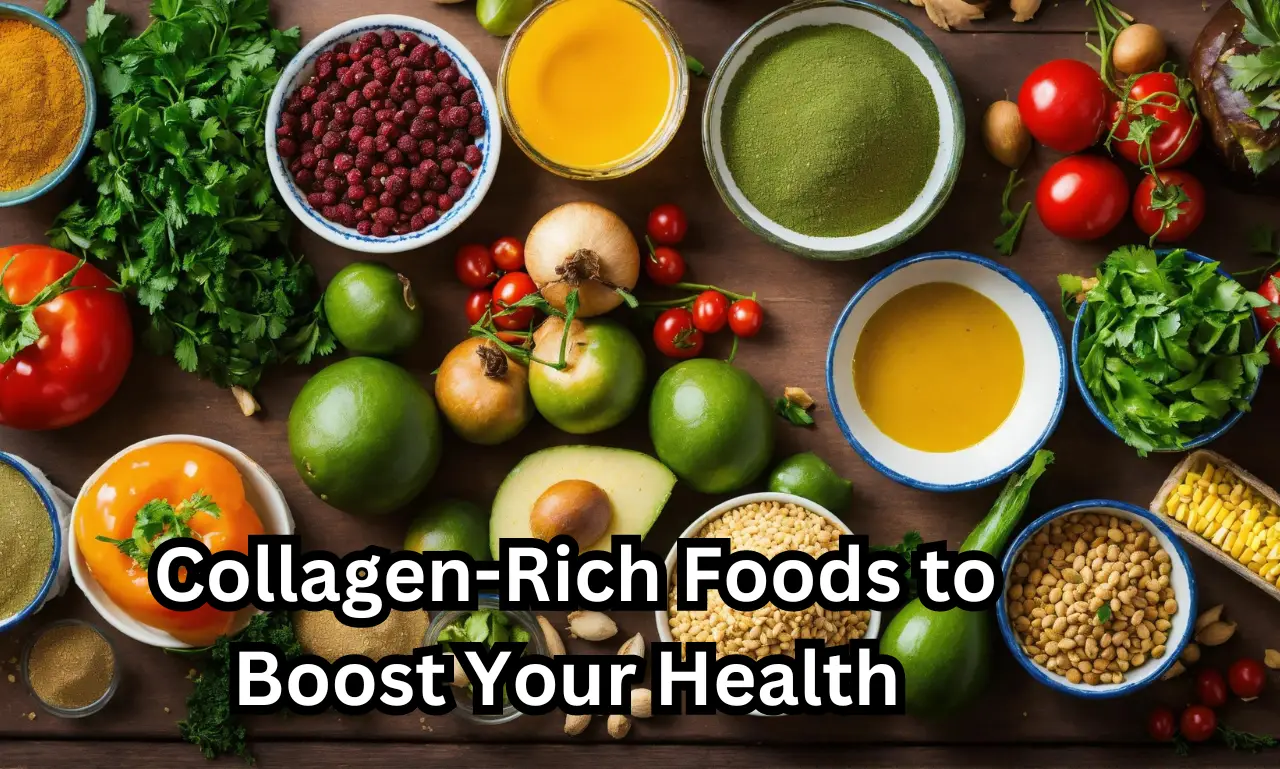Collagen is the most abundant protein in our bodies, providing structure to our skin, bones, muscles, and connective tissues. As we age, our body’s natural collagen production decreases, which can lead to wrinkles, joint pain, and weakened bones. Incorporating collagen-rich foods into your diet can help support your body’s collagen levels and improve your overall health. In this blog, we’ll explore ten collagen-rich foods that you should consider adding to your diet.

10 Collagen-Rich Foods list –
1. Bone Broth
2. Chicken
3. Fish and Shellfish
4. Eggs
5. Citrus Fruits
6. Berries
7. Garlic
8. Leafy Greens
9. Beans
10. Tomatoes
1. Bone Broth
Bone broth is one of the most well-known sources of collagen. It is made by simmering animal bones and connective tissues for an extended period, extracting collagen and other beneficial nutrients.
- Rich in Amino Acids: Bone broth contains glycine and proline, amino acids essential for collagen production.
- Supports Joint Health: The gelatin in bone broth helps maintain the integrity of joints and cartilage.
- Improves Gut Health: Bone broth can aid in healing the gut lining and reducing inflammation.
To include bone broth in your diet, try drinking it as a warm beverage or using it as a base for soups and stews.
2. Chicken
Chicken is another excellent source of collagen, particularly in the skin and connective tissues.
- High Collagen Content: Chicken skin and cartilage are rich in collagen.
- Versatile Ingredient: Chicken can be used in a variety of dishes, making it easy to incorporate into your diet.
- Supports Muscle Growth: The protein in chicken aids in muscle repair and growth.
Add chicken to salads, soups, or main dishes to boost your collagen intake.
3. Fish and Shellfish
Fish and shellfish, especially those with skin and bones, are rich in collagen.
- Type I Collagen: Fish contains type I collagen, which is particularly beneficial for skin health.
- Omega-3 Fatty Acids: These help reduce inflammation and support overall skin health.
- Easily Digestible: Fish collagen is more easily absorbed by the body compared to other sources.
Include fish like salmon, mackerel, and sardines in your diet, and consider eating the skin to maximize collagen intake.
4. Eggs
Eggs, particularly the whites and shells, are a good source of collagen.
- Egg Whites: Contain amino acids that are necessary for collagen production.
- Egg Shell Membranes: These are rich in collagen and can be found in some supplements.
- Supports Skin Health: The nutrients in eggs help maintain skin elasticity and hydration.
Enjoy eggs in various forms—boiled, scrambled, or as part of other dishes—to benefit from their collagen-boosting properties.
5. Citrus Fruits
Citrus fruits like oranges, lemons, and grapefruits are not direct sources of collagen but play a crucial role in collagen synthesis.
- Vitamin C: Essential for the production of collagen in the body.
- Antioxidant Properties: Help protect collagen from damage caused by free radicals.
- Supports Immune Function: Vitamin C also boosts overall immune health.
Incorporate citrus fruits into your diet by adding them to salads, smoothies, or simply enjoying them as snacks.
6. Berries
Berries, including strawberries, blueberries, and raspberries, are rich in antioxidants and vitamin C.
- Antioxidant-Rich: Protects existing collagen from damage.
- Vitamin C Content: Supports the body’s natural collagen production.
- Anti-Inflammatory: Helps reduce inflammation, promoting overall skin health.
Add berries to your breakfast cereals, yogurt, or smoothies for a delicious and collagen-boosting treat.
7. Garlic
Garlic is a flavorful ingredient that can also help boost collagen levels.
- Sulfur Compounds: Sulfur is necessary for collagen production and helps prevent the breakdown of collagen.
- Taurine: An amino acid in garlic that aids in collagen production and protection.
- Antioxidant Properties: Helps protect collagen from oxidative damage.
Use garlic to season your dishes, from sauces to roasted vegetables, to take advantage of its collagen-boosting properties.
8. Leafy Greens
Leafy greens such as spinach, kale, and Swiss chard are not direct sources of collagen but contribute to collagen synthesis.
- Vitamin C: High levels of vitamin C support collagen production.
- Chlorophyll: Helps in the production of procollagen, a precursor to collagen.
- Anti-Inflammatory: Reduces inflammation, supporting overall skin and joint health.
Include leafy greens in your salads, smoothies, or sautéed dishes to benefit from their collagen-supporting nutrients.
9. Beans
Beans are a plant-based source of protein and other nutrients that support collagen production.
- Amino Acids: Provide the building blocks for collagen synthesis.
- Copper: Beans contain copper, which is essential for collagen production.
- Fiber: Supports overall digestive health, which can affect skin health.
Add beans to soups, stews, salads, or as a side dish to boost your collagen intake.
10. Tomatoes
Tomatoes are another excellent source of vitamin C and lycopene, which supports collagen production.
- Vitamin C: Essential for collagen synthesis.
- Lycopene: An antioxidant that protects collagen from damage.
- Versatile Ingredient: Can be used in various dishes, from salads to sauces.
Incorporate tomatoes into your diet by adding them to salads, pasta dishes, or enjoying them fresh.
Incorporating collagen-rich foods into your diet can significantly benefit your skin, joints, muscles, and overall health. From bone broth and chicken to citrus fruits and leafy greens, a variety of foods can help boost your collagen levels. However, it’s essential to maintain a balanced diet and consider potential allergens or dietary restrictions. By including these ten collagen-rich foods in your daily meals, you can support your body’s natural collagen production and enjoy the numerous health benefits they offer.